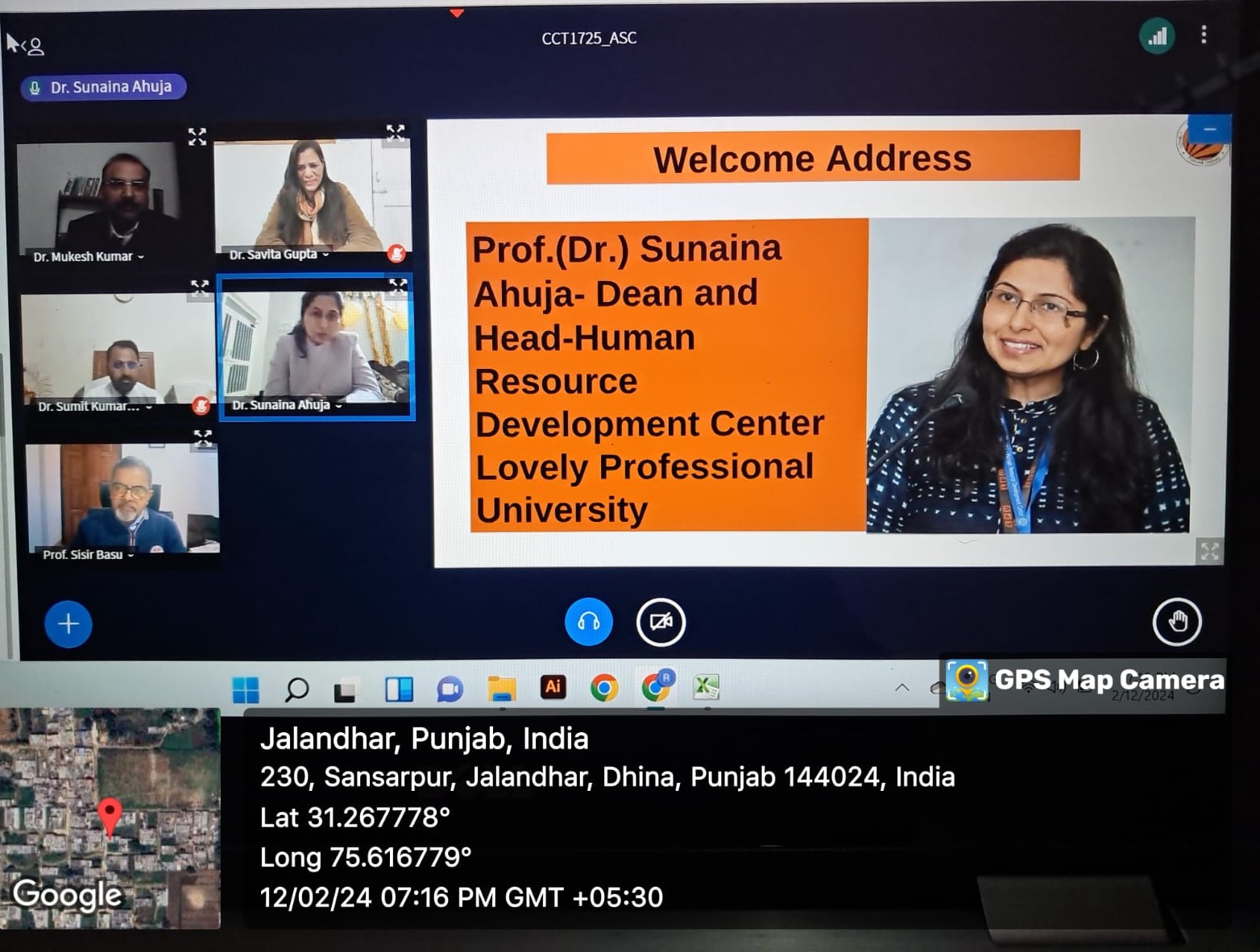Research Methodology in Mass Communication and Journalism is like a guide helping everyone to find the truth in the world of media. It’s more than just collecting data, it’s like an art that helps us to understand the stories in society. In this field, using strong research methods is important to figure out how media changes, how people behave, and how content affects us. Whether we’re looking at how digital platforms affect the news we see or studying the cultural impact of choices journalists make, having a good research method is crucial. It helps media professionals navigate challenges and create stories that are trustworthy and meaningful in a world where information is vital for changing society. In this context, School of Liberal & Creative Arts (Journalism and Mass Communication), Lovely Professional University in collaboration with HRDC Lovely Professional University conducted Short-Term Course on Research Methodology for Mass Communication and Journalism w.e.f. February 12, 2024 to February 17, 2024. Course aimed at enhancing the understanding of the basic concepts and principles of media research and research design, application of qualitative and quantitative research methods to various media-related issues and problems and to develop the data analysis skills by using software, such as SPSS, Excel, R, and present media research reports.
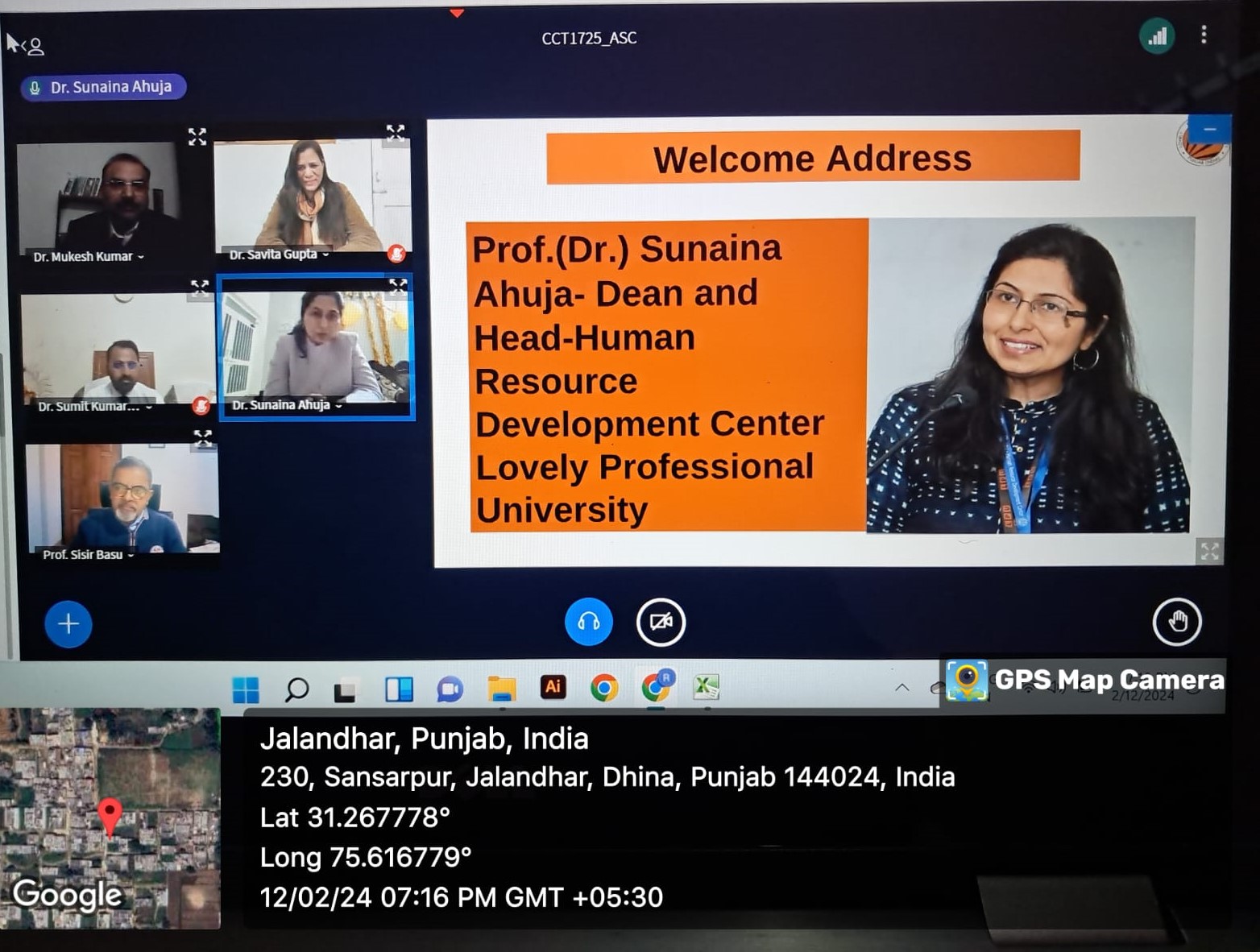
Dr. Sunaina Ahuja, Professor and Dean, Head – Human Resource Development Center (HRDC), LPU the convener of the program, warmly welcomed the participants and expressed her belief in the transformative power of the course. In her opening address, she emphasized that research methodology for mass communication and journalism uses organized methods to study media topics, including content analysis, surveys, and interviews. It helps to understand media better and guides practices based on evidence, influencing the future of communication studies. She highlighted that the combination of theoretical knowledge, practical demonstrations, and interactive sessions in the course will empower the participants to apply research methodology in the realm of media research.
Dr. Mukesh Kumar, Professor and Dean, Head-School of Liberal & Creative Arts (Journalism and Mass Communication), Lovely Professional University co-convener of the program introduced the course content and elucidated its core purpose and profound significance. Emphasizing structured methodologies like content analysis, surveys, and interviews, he highlighted how these tools empower students to delve into the intricate realms of media dynamics. Through this immersive journey, students will deepen their understanding and will be equipped to drive forward evidence-based practices, ultimately moulding the trajectory of communication research. The resource panel included Prof. Sisir Basu, Former Professor and Head- Department of Journalism and Mass Communication, Banaras Hindu University, Varanasi (Uttar Pradesh), Prof. Pradeep Krishnatray, Professor of Marketing, IFHE University, Hyderabad, Prof. Umesh Arya, Former Dean & Head, Faculty of Media Studies, Guru Jambheshwar University of Science & Technology, Hisar (Haryana) and Dr. Manvendra Singh- Associate Professor & HOD, School of Social Sciences & Languages, Lovely Professional University, Phagwara)
Day 1: Introduction to Media Research and Research Design: Prof. Sisir Basu deliberated on the foundational aspects of media research and the principles of research design. Participants were immersed in understanding the significance of research methodologies specific to media studies. Prof. Basu elucidated various research methodologies and their applications in media research, laying a strong groundwork for participants to embark on their research journey. The session provided a comprehensive overview, setting the stage for further exploration into the intricacies of media research.
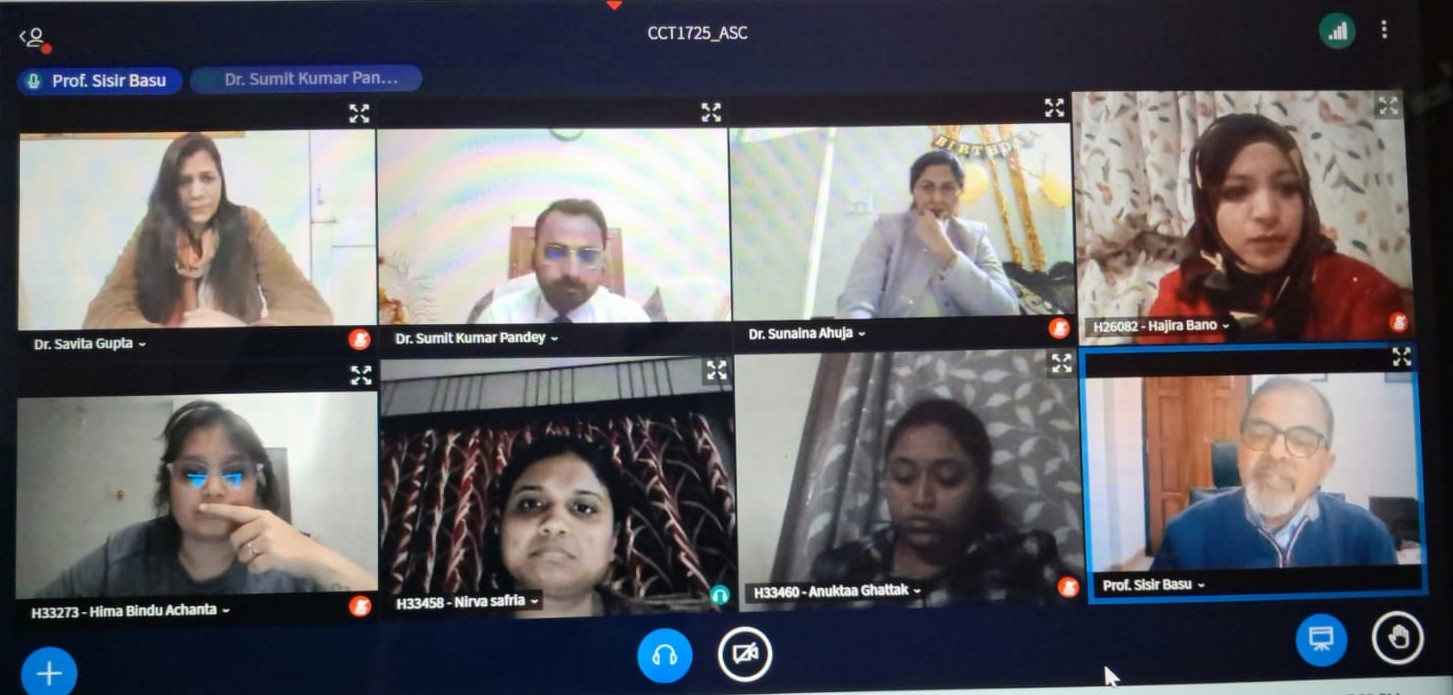
Day 2: Qualitative Research Methods for Media Research: Prof. Pradeep Krishnatray conducted a very impactful session focusing on qualitative research methods tailored for media studies. Participants engaged in an in-depth examination of qualitative methodologies, exploring their relevance and application within the context of media research. Through interactive discussions and case studies, Prof. Krishnatray facilitated a deeper understanding of qualitative data collection and analysis techniques. Participants emerged with a nuanced understanding of how qualitative research methods can enrich their investigations in media studies, setting a strong foundation for their research endeavours.
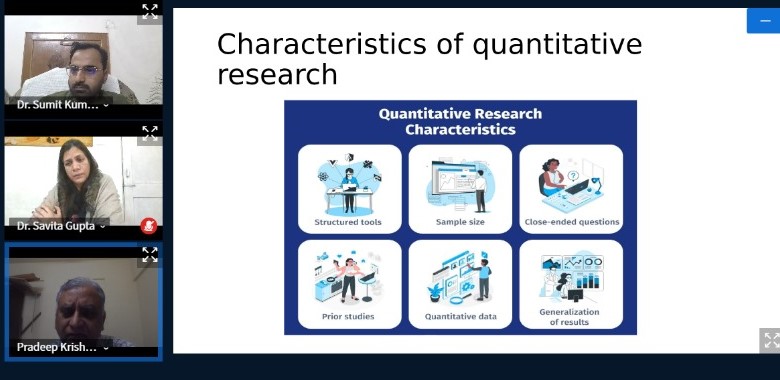
Day 3: Quantitative Research Methods for Media Research: Prof. Pradeep Krishnatray returned to mentor participants in an exploration of quantitative research methods pertinent to media studies. Delving into survey methods, statistical analysis techniques, and data interpretation principles, participants gained valuable insights into employing quantitative approaches in their media research. Prof. Krishnatray’s expertise provided participants with the necessary tools to design and conduct quantitative research studies effectively, enhancing their analytical skills and research acumen.
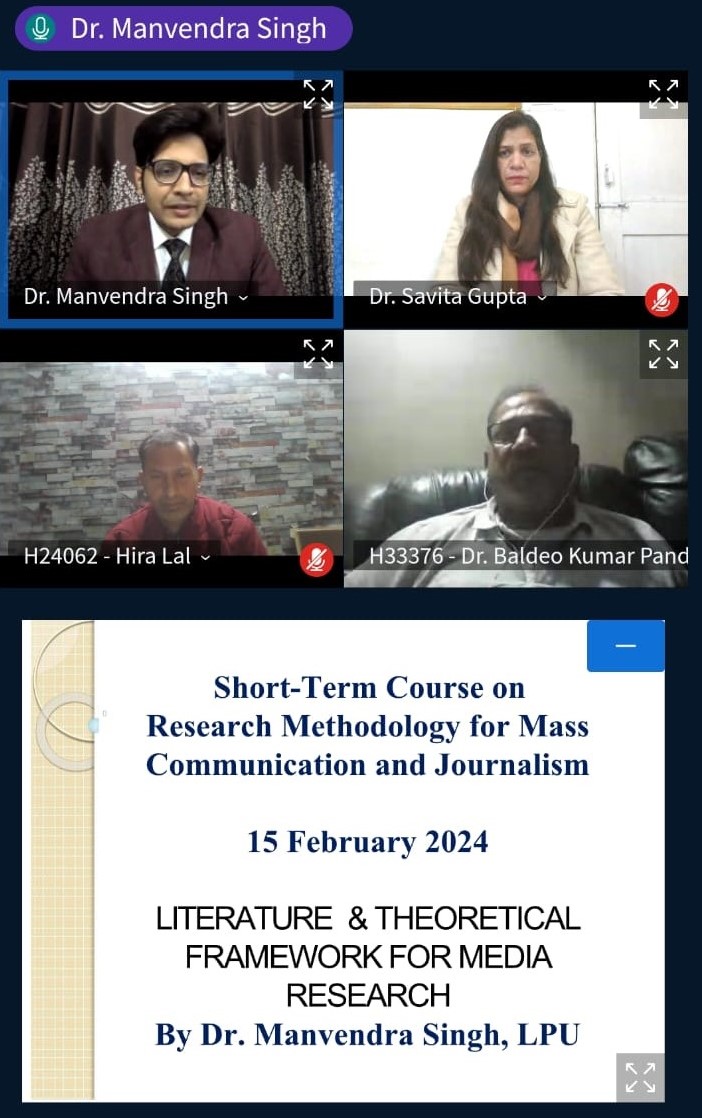
Day 4: Literature & Theoretical Framework for Media Research and AI Tools for Media Research: Dr. Manvendra Singh commenced the day with an informative session on the importance of literature review and theoretical frameworks in shaping media research. Concurrently, Prof. Umesh Arya introduced participants to the cutting-edge integration of artificial intelligence tools in media research. Through these sessions, participants gained a holistic understanding of the theoretical underpinnings and technological advancements in shaping contemporary media research practices. Prof. Arya’s demonstration of AI tools highlighted the evolving landscape of media research, equipping participants with innovative methodologies to enhance their research in media.
Day 5: Data Collection and Analysis Tools and Software for Media Research: Prof. Umesh Arya continued to engage participants, focusing on practical aspects of data collection and analysis tools and software specific to media research. Through hands-on learning experiences and practical demonstrations, participants gained proficiency in utilizing various tools and software to collect, analyse, and interpret data effectively. Prof. Arya’s session empowered participants with practical skills essential for conducting rigorous and insightful media research, enhancing their research capabilities and technical expertise.
Day 6: Writing and Presenting Media Research Reports/Papers in High-Impact Journals: Dr. Manvendra Singh guided participants in the final day’s session, emphasizing the importance of effective communication and dissemination of research findings. Equipping participants with the necessary skills to craft compelling research reports and papers for high impact journals, Dr. Singh facilitated a comprehensive understanding of the publication process. The subsequent Post Training Evaluation and Feedback session provided participants with an opportunity to reflect on their learning journey and offer insights for program enhancement. The program concluded with a Valedictory Session, celebrating the successful culmination of the Short-Term Course on Research Methodology in Mass Communication and Journalism, marking a significant milestone in participants’ research endeavours
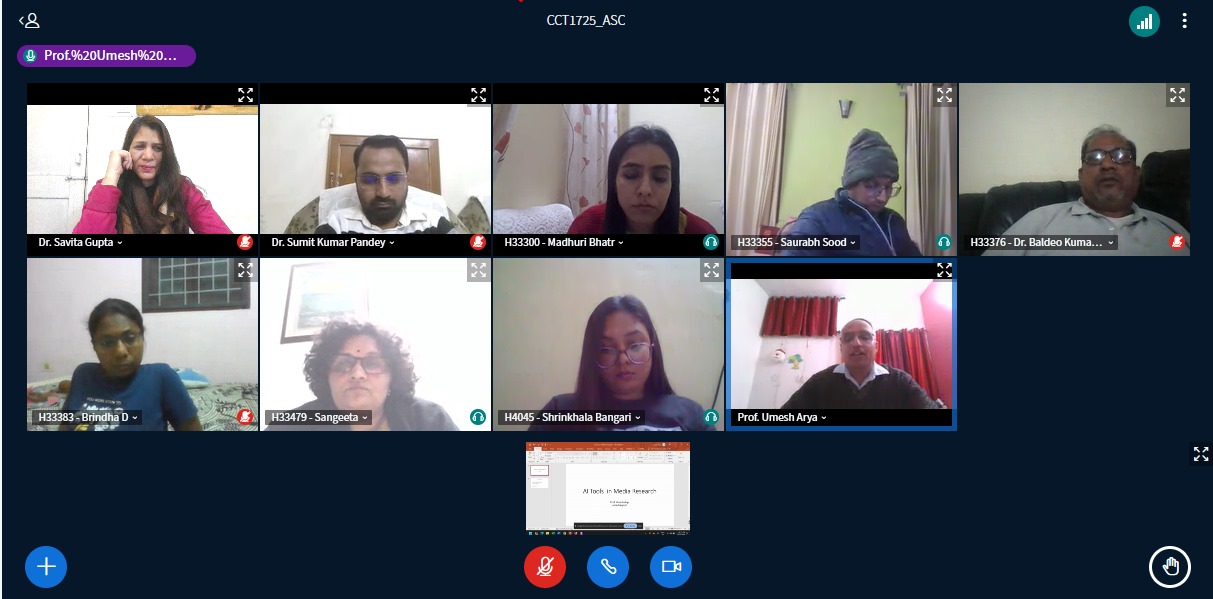
Subject Matter Experts (SMEs) strategically incorporated collaborative learning techniques, including demonstrations and case-based teaching, fostering an engaging and interactive learning environment. Post-training evaluation plays a pivotal role in assessing the effectiveness of a learning program. In this context, two types of evaluation methods were employed it was MCQ based and project-on writing an extended abstract the format for writing the abstract was also provided. The crafting of the abstract tested participants’ understanding of the theoretical underpinnings of research methodology and their ability to synthesize complex information into a concise and coherent narrative. It challenged them to articulate a statement of the problem, introduction, ROL, objectives, methodologies, and statistical techniques with clarity and precision. Furthermore, it demanded a keen eye for detail and adherence to the prescribed format, emphasizing the importance of effective communication in academic writing. Through this exercise, participants demonstrated their comprehension of research principles and also their aptitude for scholarly discourse and critical thinking. Thus, the post-training evaluation served as a robust measure of their scholarly competence and readiness to apply research methodologies in the dynamic field of Mass Communication and Journalism.
Dr. Mukesh co-convener of the program applauded Dr. Savita Gupta, Professor, HRDC, Dr. Sumit Kumar Pandey, Assistant Professor, School of Liberal & Creative Arts (Journalism and Mass Communication), Lovely Professional University & Mr. Rahul-HRDC, for organizing a meaningful short-term course, successful in meeting participants’ expectations. Feedback was solicited from the participants in response to which they appreciated the gesture shown by the LPU-HRDC in terms of choice of Subject Matter Experts and curriculum framed to make us clear about the research methodologies in the field of Mass Communication and Journalism.


